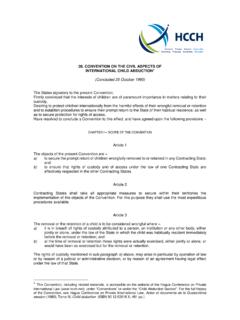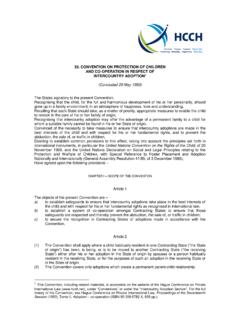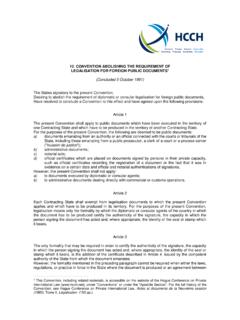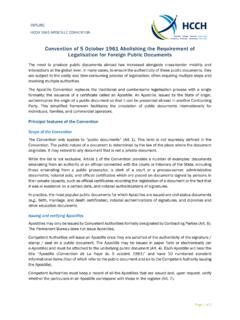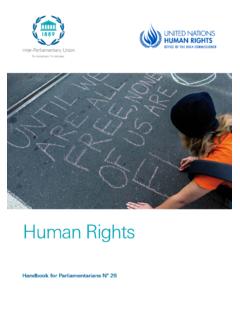Transcription of 37. CONVENTION ON CHOICE OF COURT AGREEMENTS1
1 37. CONVENTION ON CHOICE OF COURT AGREEMENTS1 . (Concluded 30 June 2005). The States Parties to the present CONVENTION , Desiring to promote international trade and investment through enhanced judicial co-operation, Believing that such co-operation can be enhanced by uniform rules on jurisdiction and on recognition and enforcement of foreign judgments in civil or commercial matters, Believing that such enhanced co-operation requires in particular an international legal regime that provides certainty and ensures the effectiveness of exclusive CHOICE of COURT agreements between parties to commercial transactions and that governs the recognition and enforcement of judgments resulting from proceedings based on such agreements.
2 Have resolved to conclude this CONVENTION and have agreed upon the following provisions . CHAPTER I SCOPE AND DEFINITIONS. Article 1. Scope (1) This CONVENTION shall apply in international cases to exclusive CHOICE of COURT agreements concluded in civil or commercial matters. (2) For the purposes of Chapter II, a case is international unless the parties are resident in the same Contracting State and the relationship of the parties and all other elements relevant to the dispute, regardless of the location of the chosen COURT , are connected only with that State. (3) For the purposes of Chapter III, a case is international where recognition or enforcement of a foreign judgment is sought.
3 Article 2. Exclusions from scope (1) This CONVENTION shall not apply to exclusive CHOICE of COURT agreements . a) to which a natural person acting primarily for personal, family or household purposes (a consumer) is a party;. b) relating to contracts of employment, including collective agreements. (2) This CONVENTION shall not apply to the following matters . a) the status and legal capacity of natural persons;. b) maintenance obligations;. c) other family law matters, including matrimonial property regimes and other rights or obligations arising out of marriage or similar relationships;. d) wills and succession;. e) insolvency, composition and analogous matters;. f) the carriage of passengers and goods.
4 G) marine pollution, limitation of liability for maritime claims, general average, and emergency towage and salvage;. 1 This CONVENTION , including related materials, is accessible on the website of the Hague Conference on Private International Law ( ), under Conventions or under the CHOICE of COURT Section . For the full history of the CONVENTION , see Hague Conference on Private International Law, Proceedings of the Twentieth Session (2005), Tome III, CHOICE of COURT (ISBN 978-9-40000-053-7, Intersentia, Antwerp, 2010, 871 pp.). h) anti-trust (competition) matters;. i) liability for nuclear damage;. j) claims for personal injury brought by or on behalf of natural persons;. k) tort or delict claims for damage to tangible property that do not arise from a contractual relationship.
5 L) rights in rem in immovable property, and tenancies of immovable property;. m) the validity, nullity, or dissolution of legal persons, and the validity of decisions of their organs;. n) the validity of intellectual property rights other than copyright and related rights;. o) infringement of intellectual property rights other than copyright and related rights, except where infringement proceedings are brought for breach of a contract between the parties relating to such rights, or could have been brought for breach of that contract;. p) the validity of entries in public registers. (3) Notwithstanding paragraph 2, proceedings are not excluded from the scope of this CONVENTION where a matter excluded under that paragraph arises merely as a preliminary question and not as an object of the proceedings.
6 In particular, the mere fact that a matter excluded under paragraph 2 arises by way of defence does not exclude proceedings from the CONVENTION , if that matter is not an object of the proceedings. (4) This CONVENTION shall not apply to arbitration and related proceedings. (5) Proceedings are not excluded from the scope of this CONVENTION by the mere fact that a State, including a government, a governmental agency or any person acting for a State, is a party thereto. (6) Nothing in this CONVENTION shall affect privileges and immunities of States or of international organisations, in respect of themselves and of their property. Article 3. Exclusive CHOICE of COURT agreements For the purposes of this CONVENTION .
7 A) exclusive CHOICE of COURT agreement means an agreement concluded by two or more parties that meets the requirements of paragraph c) and designates, for the purpose of deciding disputes which have arisen or may arise in connection with a particular legal relationship, the courts of one Contracting State or one or more specific courts of one Contracting State to the exclusion of the jurisdiction of any other courts;. b) a CHOICE of COURT agreement which designates the courts of one Contracting State or one or more specific courts of one Contracting State shall be deemed to be exclusive unless the parties have expressly provided otherwise;. c) an exclusive CHOICE of COURT agreement must be concluded or documented.
8 I) in writing; or ii) by any other means of communication which renders information accessible so as to be usable for subsequent reference;. d) an exclusive CHOICE of COURT agreement that forms part of a contract shall be treated as an agreement independent of the other terms of the contract. The validity of the exclusive CHOICE of COURT agreement cannot be contested solely on the ground that the contract is not valid. Article 4. Other definitions (1) In this CONVENTION , judgment means any decision on the merits given by a COURT , whatever it may be called, including a decree or order, and a determination of costs or expenses by the COURT (including an officer of the COURT ), provided that the determination relates to a decision on the merits which may be recognised or enforced under this CONVENTION .
9 An interim measure of protection is not a judgment. (2) For the purposes of this CONVENTION , an entity or person other than a natural person shall be considered to be resident in the State . a) where it has its statutory seat;. b) under whose law it was incorporated or formed;. c) where it has its central administration; or d) where it has its principal place of business. CHAPTER II JURISDICTION. Article 5. Jurisdiction of the chosen COURT (1) The COURT or courts of a Contracting State designated in an exclusive CHOICE of COURT agreement shall have jurisdiction to decide a dispute to which the agreement applies, unless the agreement is null and void under the law of that State. (2) A COURT that has jurisdiction under paragraph 1 shall not decline to exercise jurisdiction on the ground that the dispute should be decided in a COURT of another State.
10 (3) The preceding paragraphs shall not affect rules . a) on jurisdiction related to subject matter or to the value of the claim;. b) on the internal allocation of jurisdiction among the courts of a Contracting State. However, where the chosen COURT has discretion as to whether to transfer a case, due consideration should be given to the CHOICE of the parties. Article 6. Obligations of a COURT not chosen A COURT of a Contracting State other than that of the chosen COURT shall suspend or dismiss proceedings to which an exclusive CHOICE of COURT agreement applies unless . a) the agreement is null and void under the law of the State of the chosen COURT ;. b) a party lacked the capacity to conclude the agreement under the law of the State of the COURT seised.
